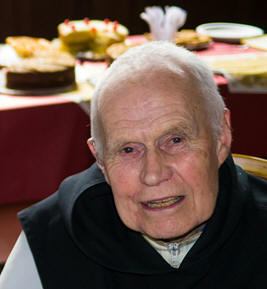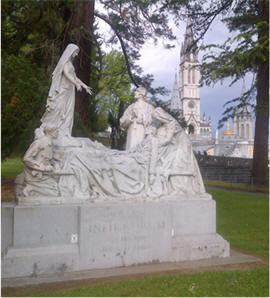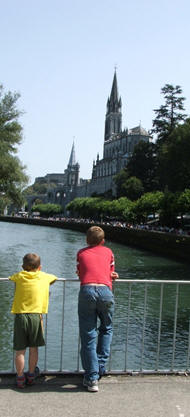Catholic Medical Quarterly Volume 70(1) February 2020
Obituary
Br Michael Strode - 1923-2019
Founder of the Handicapped Children’s
Pilgimage Trust (HCPT).
 Michael
Strode was one of the most influential British Catholic laymen in the
second half of the last century, with particular regard to taking disabled
people on pilgrimage to Lourdes.
Michael
Strode was one of the most influential British Catholic laymen in the
second half of the last century, with particular regard to taking disabled
people on pilgrimage to Lourdes.
He was born in Woking on June 5th 1923, one of four brothers. After his education at Haileybury, in 1942 he enrolled at St Thomas' Hospital Medical School. While a student, he followed his mother's earlier example and became a Catholic – the first highly significant event in the development of his life's work.
He qualified MRCS LRCP in 1946 and after one house job, joined the RNVR as a Surgeon Sub-Lieutenant to do his National Service. Unfortunately he contracted pulmonary tuberculosis which required prolonged sanatorium treatment at Haslar and King Edward VII hospitals. On leaving the navy he was casualty officer at St James' Balham and then sought what he thought would be a quiet placement giving him time for post-graduate study. He took, as a temporary appointment, the post of Resident Medical Officer at the Chailey Heritage Hospital and School in Sussex. However, he remained in this post until his retirement in 1988 acquiring in this time unrivalled expertise in the care and management of gravely disabled young people. This was the second profoundly important influence in the unfolding of his life's achievements.
He noted at Chailey that the C of E children enjoyed an annual seaside holiday but there was no such provision for the Catholics so, in 1954, with a colleague Peter Keevney he took four boys from the Heritage on a holiday pilgrimage to Lourdes. This venture was such a success that in 1956 he formed a charitable trust entitled the Handicapped Children's Pilgrimage Trust thereafter usually known as 'HCPT' (in the 1950s the word 'handicapped' was a widely used term in both law and everyday language to describe a person with a physical or mental impairment).
 From
this modest beginning The Trust grew steadily and Michael was joined by an
increasing band of enthusiasts so that, reaching far beyond Chailey, it
became necessary to form the young pilgrims into 'family' groups of ten
children, with an appropriate number of helpers according to the needs of
the children.
From
this modest beginning The Trust grew steadily and Michael was joined by an
increasing band of enthusiasts so that, reaching far beyond Chailey, it
became necessary to form the young pilgrims into 'family' groups of ten
children, with an appropriate number of helpers according to the needs of
the children.
This simple pattern remains the basic organisational unit of the Trust's Easter pilgrimage over sixty years later. From the outset Michael emphasised the holiday aspect of the enterprise and insisted that the children stay with their helpers in comfortable hotels rather than the austere 'hospitals' which provided accommodation for pilgrims at Lourdes. New groups were soon formed throughout the UK and in the Republic of Ireland where Michael's unique vision had found a receptive audience and 'IHCPT' (now the Irish Pilgrimage Trust) was founded.
The current Easter pilgrimage numbers about 5000 individuals: it is now the largest regular annual pilgrimage from the British Isles and, almost certainly, the biggest children's pilgrimage in the world. The event is joined by 'ASCPG' – the 'American Special Children's Pilgrimage Group’ together with groups from the West Indies and former iron-curtain countries Croatia, Slovakia and Romania, and latterly from Spain, Poland, Italy, Switzerland and Belgium.
In nearly all groups the majority of helpers are under the age of thirty ; the group members are largely responsible for raising funds for the children and there is a firm tradition that helpers pay their own fares. Although HCPT is obviously a Catholic organisation the young people and their helpers come from all religious traditions and none. In this enterprise Michael became a pioneer in both promoting activities of disabled people and integrating them in society – a vision in the 1950s now exemplified by the worldwide Paralympic movement. Disabled children are not generally-speaking 'ill' but Dr Strode always insisted on the most rigorous medical assessments.
Back at Chailey Michael became aware that several disabled children seemed never to go home for weekends or holidays and so never had the experience of family life in a real house. Accordingly he took the opportunity in 1970, having received a legacy, to purchase a nearby property 'Leyden House.' He then persuaded one of the nursing sisters in the hospital with her husband to take up residence and become, in effect, foster parents to ten disabled children. Thus was born Michael's second charitable venture: the 'Leyden House Trust' sustained by an army of volunteers – the sort of people invariably attracted by his quiet but charismatic leadership. At first the charity prospered steadily and a large extension was added in 1979 but by the 1990s conditions had changed and so Michael negotiated an alteration in the trust deed enabling the house to be used by adult former Chailey patients. Sadly it proved difficult to keep full occupancy of the converted en-suite rooms and by 2008 it was reluctantly decided to close the charity, re-house the remaining tenants and distribute the residual assets to other charities with kindred objectives.
 The spirit
of Leyden House lives on in the memories of adults who had lived there as
children in an atmosphere of love and laughter and in the recollections of
countless volunteers who had shared Michael's high-spirited generosity
The spirit
of Leyden House lives on in the memories of adults who had lived there as
children in an atmosphere of love and laughter and in the recollections of
countless volunteers who had shared Michael's high-spirited generosity
In the 1970s some young people who had outgrown the HCPT children's event asked if some provision could be made so that they could again experience the fun, excitement and spiritual refreshment that HCPT provided them in Lourdes. Michael and his colleagues on the board of Governors bought a small hotel at Bartrès, a village near Lourdes where the young St Bernadette had worked as a shepherdess. The building was readily adapted for the needs of disabled people and in 1975, newly named 'Hosanna House', was opened for the first season of weeks in which disabled pilgrims and their helpers could enjoy both the busy Lourdes experience and the tranquillity of the house with its superb view of the distant Pyrenees. Over the years the original building has been greatly extended with a striking central chapel and purpose-built accommodation for two groups of fifty people. Hosanna House was originally established as a separate charitable Trust – thus being the third foundation initiated by Michael.
Dr Strode's many admirers sought national recognition for his achievements in the charitable field and he was duly awarded the MBE. Unfortunately the citation also referred to his salaried work at Chailey Heritage: with characteristic modesty he declined to accept an honour “for just doing my job”. However he did accept the KSG (Knight of St Gregory) a papal honour given by the church for exceptionally meritorious service.
Michael's last visit to his beloved Lourdes was in his 90th year bent almost double after a painful series of episodes of collapsed vertebrae which he had endured with cheerful stoicism. His sparkling humour was undimmed, his diffident manner concealing, as ever, a personality of steely resolve - all underpinned by his manifest holiness.
Michael had had a great interest in monastic life and after his retirement joined the Cistercian Community on Caldey Island, South Wales (a place to which he had taken children from Chailey Heritage on holiday over several years).The monastic tradition of silence in no way inhibited his heartfelt concern for the enterprise he had founded, and he was probably the main user of the Abbey’s telephone service for many years.
In latter years his increasing physical frailty meant that he could no longer sustain the austere life of the Caldey monastery and he was happily accommodated in Nazareth House in Cardiff. Here he was able to attend daily Mass, receive visitors and, equipped with an indispensable telephone, maintain contact with all his innumerable friends.
He died, fortified with rites of the Holy Church on the morning of Friday 27th December 2019. He is survived by his brother Peter.
David Pepworth is Marketing and Communications Manager, HCPT.
